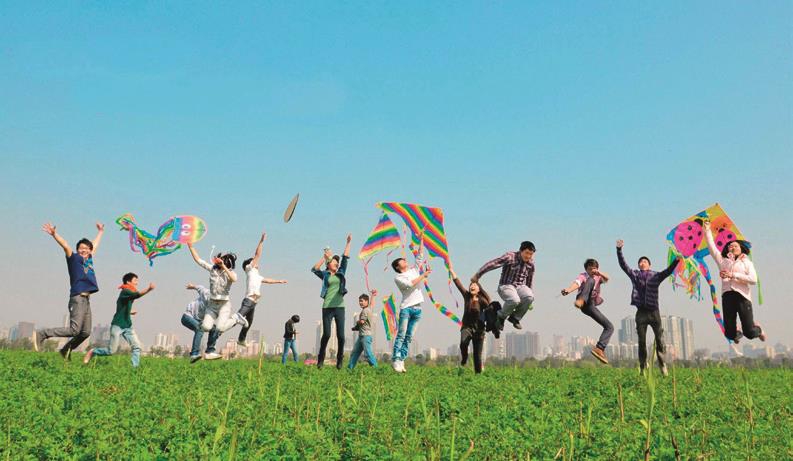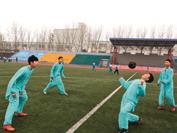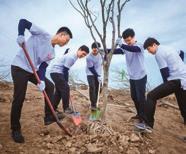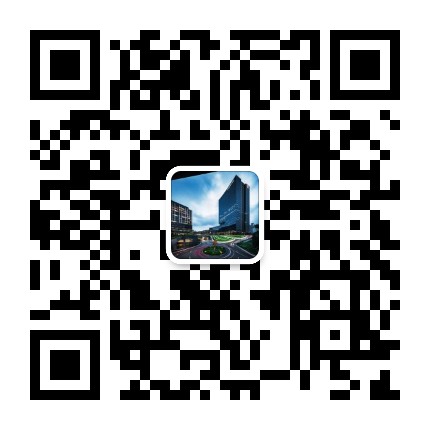

On a spring outing.
QINGMING Festival is a traditional day in China which has a history of over 2,500 years. It is a day on which the final resting places of one's family ancestors are swept clean and sacrifices are offered for the souls of the departed. As people always go out on excursions on this day, it is also called the Spring Outing Day.Qingming Festival falls around April 5 on the Gregorian calendar, about a fortnight after the Spring Equinox.
At the beginning, “Qingming” was just the name of a solar term among China's 24 solar terms (24 fixed nodes in the solar calendar to indicate the change of seasons). This time of year is optimum for spring plowing and planting in most parts of China as the weather gets warmer and there is more rainfall.
The festival is closely linked with the Hanshi or Cold Food Festival. The latter, one to two days before the former, was another festival observed in ancient China. On this day, people were not allowed to light a fire to cook. Instead, they could only eat food prepared a day earlier, hence the name, cold food. Paying respects at ancestors' tombs was also a big event on this day. As Qingming Festival was very close to the Cold Food Day, people often mixed them up. During the Song and Yuan dynasties about 1,000 years ago,the Qingming Festival gradually replaced the other and took over its customs and activities.
Later, Qingming Festival also combined the Shangsi Festival (held on the third day of the third lunar month), another festival traditionally celebrated with spring outings, during which people would wash in a river to pray for good luck. It's also a way to get refreshed after a long, dull winter.
Qingming, which combines the essence of the two ancient holidays, eventually evolved into a traditional festival in the Song and Yuan dynasties, with ancestor worship at a cemetery as the central activity on that day. It falls on April 5 this year.
There are many interesting legends about this festival. The story of Liu Bang, the founding father of the Han Dynasty, searching for ancestral graves is the most popular one.
According to legend, at the end of the Qin Dynasty, Liu Bang defeated Xiang Yu, the overlord of the Western Chu Kingdom (206-202 BC), and became the founding emperor of the Han Dynasty. When Liu Bang returned home as an emperor, he wanted to visit his parents' tombs. But years of war had left the graveyard overgrown with weeds, and he could not find his parents' final resting places. Liu Bang was very sad, although his men helped him to look through all the tombstones, at dusk, they still had not found them.
Finally, Liu Bang took out a piece of paper from his sleeves and tore it into many smaller pieces. He held them tightly in his hand and prayed to heaven:“My parents have spirits in heaven. They will conduct me to find their tombs by the scrapes of paper. I will throw them into the air. Where they fall down and keep still, there must be my parents' graves.”
From the Tang Dynasty (618-907) onward, visiting ancestral graves was also accompanied by outings and lots of fun activities. As people needed to go to the outskirts where the graveyards were normally located,they could also enjoy the comforting and relaxing trip along the way.
Later, the general public also followed suit. Every year on the Qingming Festival, they would return to their ancestors' final resting places to worship them,and put a small piece of paper beside it with clods of earth on top, an indication that the grave was taken care of.
Remembering ancestors at gravesites: On this day, apart from cleaning away the weeds growing on graves, people also present offerings of worship to their ancestors. Incense and joss paper are normally burnt, and bunches of flowers are put on gravestones as a way of showing their respect.
Spring outings: In spring, the world becomes vibrant, it is a good season for enjoying nature and life.
Tree planting: As it gets warm and rainfall increases, saplings find this time of year optimum to bloom. As a result, planting trees on this day has become a tradition. That's why it is also called the “Arbor Day.”

Grown-ups and chiIdren aIike enjoy flying kites in the suburbs.

SchooI kids pIaying cuju, a kind of footbaII, in their traditional Chinese dress.

Young men working together to plant a tree.
Riding swings: In ancient times in China, swings were built from tree trunks and branches with ribbons tied to them. It gradually developed into two ropes linking a pedal. Riding swings is not only good for health, but can also cultivate courage, so today many people still like riding swings, especially children.
Cuju, a football game: Ju is a kind of leather ball with wool fillings. Cuju means using feet to kick a ball, which is the predecessor of modern football. It was said that the ball was invented by Yellow Emperor, a legendary ruler in the very beginning of China,to train his warriors. Ancient people normally cuju on this festival.
Kite flying: In ancient times it was thought that flying kites on the Qingming Festival could release their foul air. After flying the kites in the sky, they would cut the string to send them flying off to the ends of the earth as a way to express their wish for the elimination of disease or bad luck.
Tug of war: Invented in the late Spring and Autumn period (770-476 BC), it first became popular among the armies, and then spread to the general public. During the reign of Emperor Xuanzong of the Tang Dynasty, large-scale tug of war competitions were held on this festival. Since then, it has become a part of the Qingming Festival customs.
Willow wearing: Qingming Festival is a time when willows sprout and turn green. When the ancient Chinese went for an outing, they would break off a few wicker branches to wear on their heads or insert into the earth. Today, people play with them, weave them into hats, wear them on their heads, or take them home to hang on the lintels and eaves.
© 2019-2021 All rights reserved. 北京转创国际管理咨询有限公司 京ICP备19055770号-1
Beijing TransVenture International Management Consulting Co., Ltd.
地址:北京市大兴区新源大街25号院恒大未来城7号楼1102室
北京市丰台区南四环西路128号诺德中心2号楼5层
北京市海淀区西禅寺(华北项目部)
江苏省无锡市滨湖区蠡溪路859号2131室
深圳市南山区高新科技园南区R2-B栋4楼12室
深圳市福田区华能大厦
佛山顺德区北滘工业大道云创空间
汕头市龙湖区泰星路9号壹品湾三区
长沙市芙蓉区韶山北路139号文化大厦
梅州市丰顺县大润发大厦

欢迎来到本网站,请问有什么可以帮您?
稍后再说 现在咨询